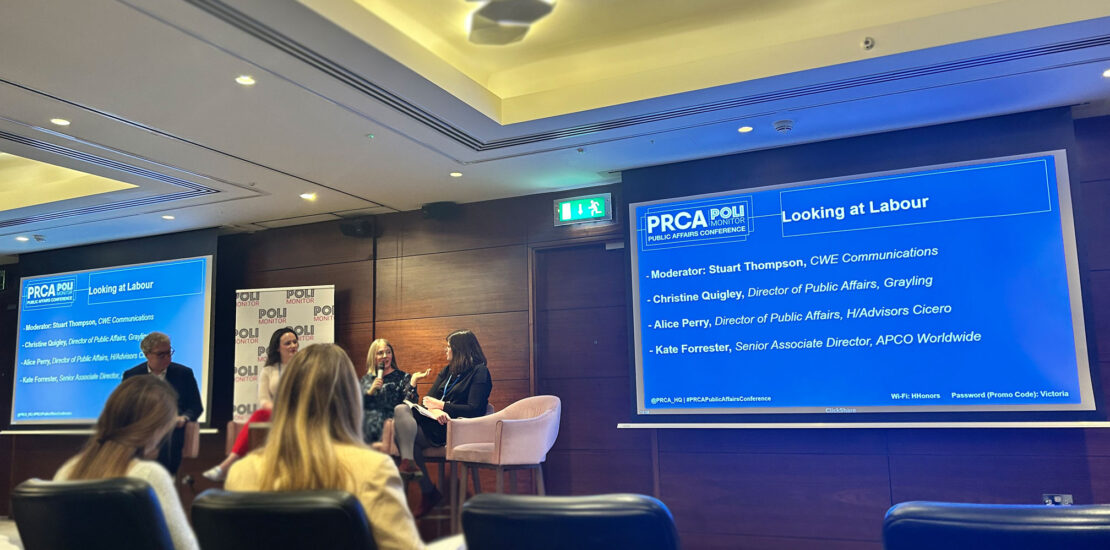- November 28, 2023
- Posted by: lutherpendragon
- Categories: insight, news

Although the exact date of a general election remains hotly up for debate (May? October? January 2025?), there can be little doubt that one is fast careering around the corner. And with the Labour Party a good 20-points ahead of the Conservatives in the polls, the collective attention of the public affairs industry is turning to how it can engage with what is seen by many as a government-in-waiting, and reflecting on how a change in administration may necessitate a change in PA tactics.
It’s a mark of just how long Labour has been out of power that even senior public affairs pros have never had the opportunity to engage with a Labour government during their career. In many respects, expect business as usual; at its core, public affairs is about relationships, shared interests and desired outcomes, regardless of who’s in power. But expect less churn of ministers and secretaries of state than has become normalised over recent years. The Shadow Cabinet we see today is overwhelmingly likely to be the one which Keir Starmer takes into the next election, and this offers a real opportunity to build strong relationships over the coming months and years across the Labour Party tapestry, and to guide key figures through our clients’ areas of policy expertise.
The Labour leadership will be driven, at least in the first years of government, by economic growth. Starmer has made it clear that investment in public services will be his “single defining mission” as Prime Minister. Tailoring messaging to exemplify how client initiatives can help power growth, jobs, and skills in a socially responsible and just manner will allow your voice to be heard more clearly through the noise. Starmer and Shadow Chancellor Rachal Reeves have also made a concerted effort over the past few years to engage with business and financial services – or, as one person told Gabriel Pogrund, if you wear a tie, you’ve probably gone for coffee with Reeves. Policy pragmatism and aspiration will be at the heart of a Starmer-led government.
But who are the people and organisations that will be at the heart of decision making during a Labour government? Keeping track of prospective parliamentary candidate (PCC) selections is hugely important. Experienced PPCs, including returning former Labour MPs such as Emma Reynolds, Douglas Alexander and Heidi Alexander, will likely play key roles in a Starmer government which is seen by some as lacking legislative know-how. Up and coming candidates such as Andrew Pakes for Peterborough and Miatta Fahnbulleh in Camberwell and Peckham have also been tipped as ones to watch.
The influence of Labour-aligned think tanks is also significant. Labour Together, the Tony Blair Institute for Global Change, and the IPPR, are seen as particularly close to the Labour leadership. The importance of Labour-affiliated organisations and societies also cannot be overstated. The likes of the Fabians, SERA, and Labour in the City act as policy incubators for areas from the environment to financial services, while there are more than 20 MPs affiliated with the Co-operative Party.
Finally, the unions. Though they may not be the kingmakers they once were under Corbyn, unions still hold significant influence over both the party’s National Executive Committee and its policy making processes. Unions can often get pigeonholed as only being relevant to industrial relations, but their role in influencing policy – from being an initial sounding board right up to the ‘Clause V’ meeting where the party manifesto is signed off – and their sector-specific interests make them a valuable partner in policy promotion.
A changing of the guard in government offers an opportunity for public affairs pros to shore up support within the current opposition. Making sure your policy asks are heard early whilst party positions are still being formulated, and ensuring your messages are targeted at the right people, from trade union to Shadow Cabinet, are key to successful engagement with Labour.
Luther Pendragon is one of the UK’s most highly-regarded independent consultancies, with a 30 year track record of helping organisations understand and manage political risk and tell compelling stories to the people that matter. Contact us to find out how we can help your organisation make an impact.
